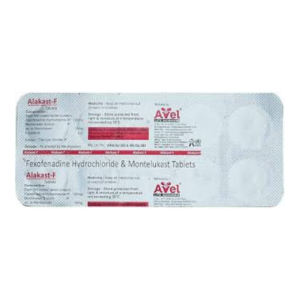ALTHROCIN 500MG TABS
₹120.80
-
Active Ingredient: Azithromycin (500 mg per tablet)
-
Uses: Althrocin 500 mg is commonly prescribed for respiratory infections, skin infections, sexually transmitted infections, and ear infections.
-
How It Works: Azithromycin works by inhibiting bacterial protein synthesis, thereby preventing bacteria from growing and multiplying.
Description
Althrocin 500 mg Tablets are effective for treating a range of bacterial infections. Azithromycin, the active ingredient, is a broad-spectrum antibiotic that can target both gram-positive and gram-negative bacteria. It works by binding to the bacterial ribosome, inhibiting protein synthesis and halting bacterial growth.
Common Uses:
-
Respiratory Tract Infections:
-
Pneumonia
-
Bronchitis
-
Sinusitis
-
Pharyngitis (throat infection)
-
-
Ear Infections: (Otitis media)
-
Skin and Soft Tissue Infections: (e.g., impetigo, cellulitis)
-
Sexually Transmitted Infections:
-
Chlamydia
-
Gonorrhea
-
-
Other Bacterial Infections:
-
Tonsillitis
-
Urethritis
-
Dosage and Administration:
-
Usual Dosage:
-
For adults, the typical dose is 500 mg once daily for 3–5 days depending on the infection type.
-
For certain infections (e.g., chlamydia), a single dose of 1 g (1000 mg) may be prescribed (typically 2 tablets of 500 mg).
-
-
Administration:
-
Take the tablet with or without food.
-
It’s important to take the entire prescribed course, even if symptoms improve before the medication is finished.
-
Common Side Effects:
-
Gastrointestinal Disturbances: nausea, vomiting, diarrhea, abdominal pain
-
Dizziness or headache
-
Skin Rash or mild allergic reactions
-
Liver Function Alterations (rare but serious)
Precautions:
-
Allergic Reactions: If you’re allergic to Azithromycin or any other macrolide antibiotics, avoid using Althrocin.
-
Liver Function: Azithromycin is processed in the liver, so it should be used cautiously in individuals with liver disease.
-
Kidney Function: If you have kidney problems, your doctor may need to adjust the dose.
-
Drug Interactions: Azithromycin can interact with certain medications, including:
-
Antacids (which can reduce the absorption of Azithromycin)
-
Warfarin (an anticoagulant, leading to increased bleeding risk)
-
Certain heart medications, especially those that affect the QT interval (e.g., some antiarrhythmics).
-
-
Pregnancy and Breastfeeding: Generally considered safe during pregnancy and breastfeeding, but always consult a healthcare provider before use.









Reviews
There are no reviews yet.